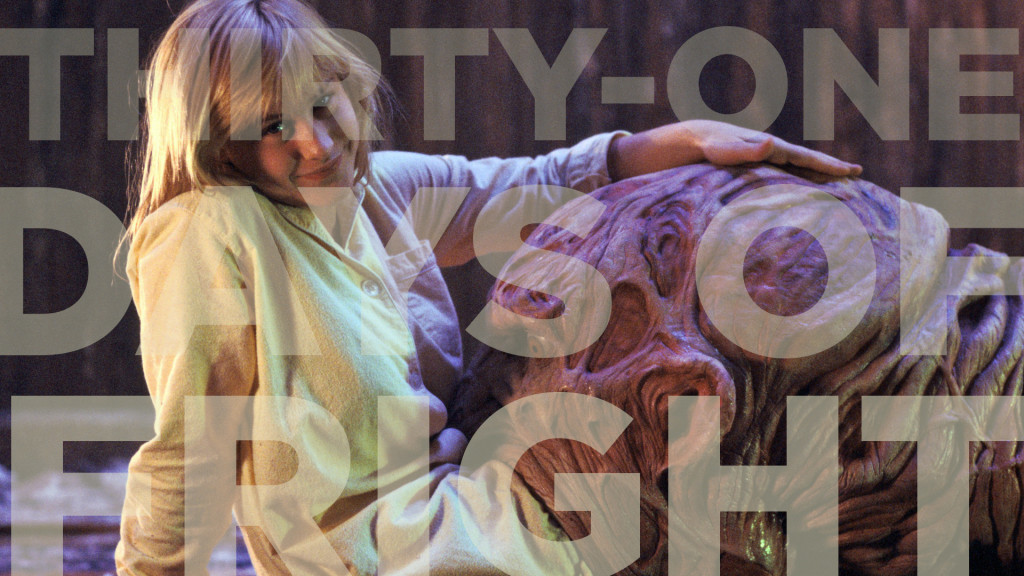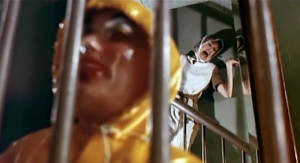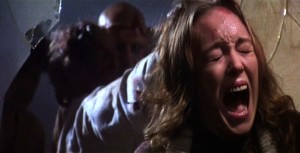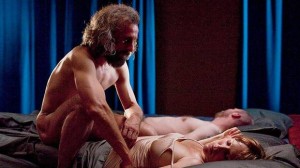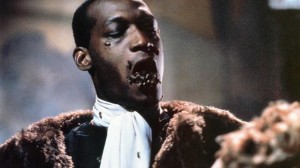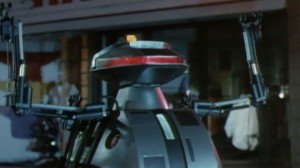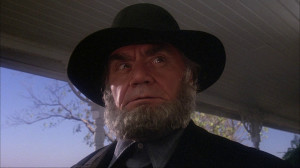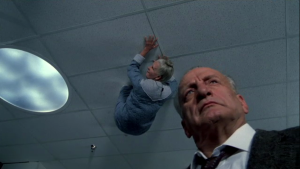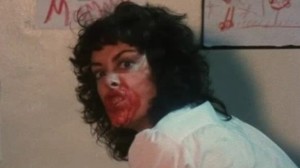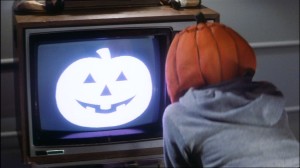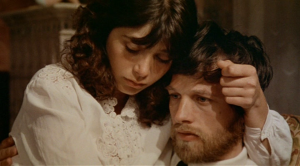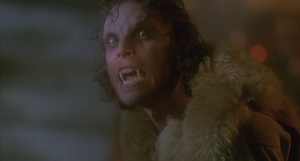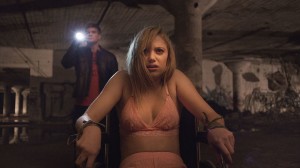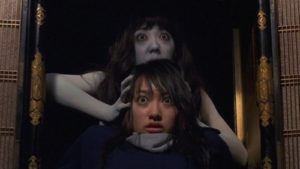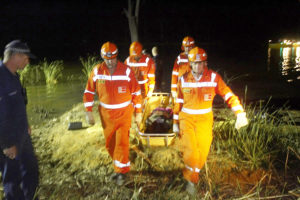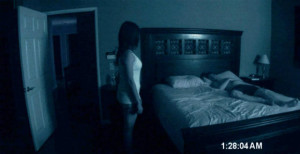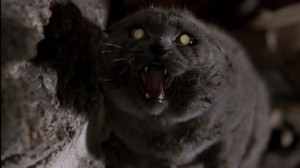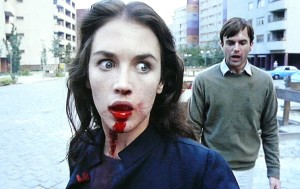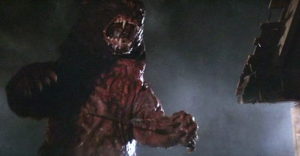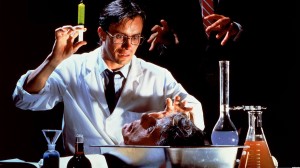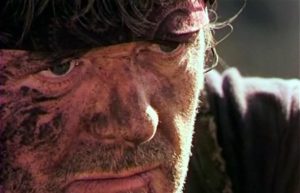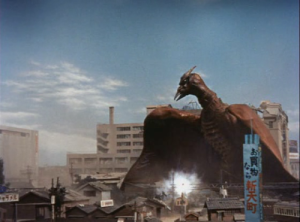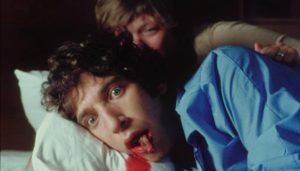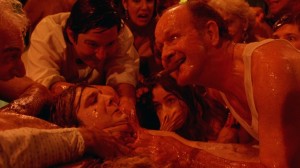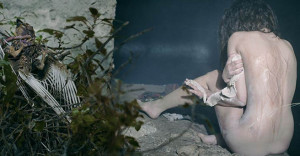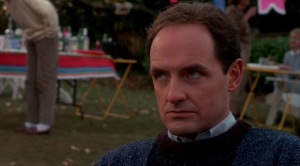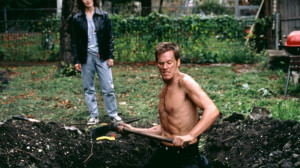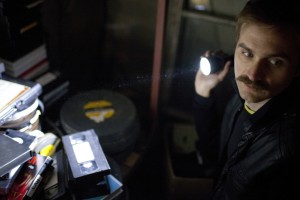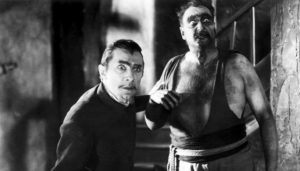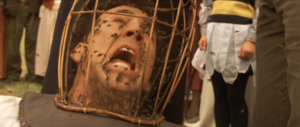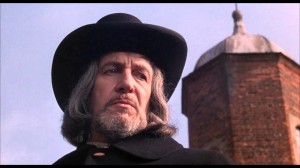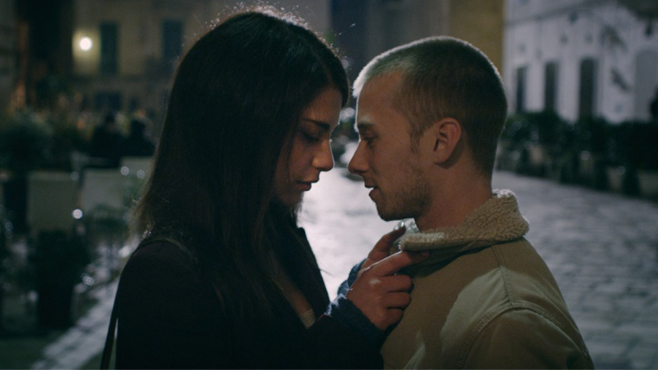
It’s like The Trip to Italy, with fewer Bane impressions and more skin lesions.
This January, in support of the Toronto Rape Crisis Centre / Multicultural Women Against Rape, friends and family have raised over $1,000, which means I have to watch and write about thirty-one horror movies. I’ll watch (on average) one movie a night, many of them requested by donors, after which I’ll write some things about said movies on this website. Be forewarned that all such write-ups will contain spoilers! The most recent film – which seems cruelly titled given the weather in Toronto these days – is Spring, directed by the directorial duo of Justin Benson and Aaron Moorhead (Resolution, V/H/S: Viral. Spring was the request of Alison Lang, who you might know as editor at Broken Pencil or staff writer for Rue Morgue. Additionally, she’s a very smart debater of horror films. (In fact, she was part of the team that successfully argued The Exorcist III was the best horror sequel at The Black Museum Lecture Series, an event mentioned in my earlier review.) Spring was rented from the fine folks at Bay Street Video.
What happens:
In spring (and in Spring), a young man’s thoughts turn to love … but I’m getting ahead of myself. Love is on display in the opening scene of this low-key, inventive horror film, but it’s the love of a son for his mother. A young sous chef, Evan Russell (Lou Taylor Pucci), watches over his bedridden mother, replacing the water in her humidifier as she gasps and wheezes. His mother, dying from cancer, tells her son a joke about a florist’s mix-up, and a grieving husband who receives a bouquet of flowers at his wife’s funeral: “Congratulations on the new location.” Seconds later, Evan’s mom dies. This gallows humour prepares audiences for a movie that’s a dark mix of horror and comedy.
Next we see Evan, he’s drinking post-funeral at the bar where he works. His boss, bartender Mike (Vinny Curran), noting Evan’s state, says he’ll call in someone to cover his shift. His drinking buddy, a fisherman named Tommy (Jeremy Gardner), notes that the funeral was intimate, and Evan admits his parents had no other family but him, and no real friends to speak of. On his way to the washroom, Evan bumps into a rough-looking customer who wants to start some static. Tommy tries to defuse the situation, but when the goon reaches for a bottle to smash him, Evan flies into berserker mode, punching the dude so hard his grill flies out. (This, of course, also injures Evan’s hand; it hurts to punch a face full of metal.) In the aftermath, Mike reluctantly tells Evan he has to let him go – he can’t have staff beating up the customers. “The Yelp reviews would kill me,” he moans. Tommy and Evan head to his house to continue drinking.
The now grill-less anger management case, hanging out the passenger side of his best friend’s ride, hollers at Evan and Tommy as he drives by. He knows where Evan lives and Evan, understandably, feels unsafe. Tommy offers to stay with him overnight, but won’t sleep in his mother’s death bed, the only free bed in the house. As Tommy drunkenly staggers home, he suggests Tommy call someone up for a “sympathy fuck,” an idea Evan shoots down. But he’s grieving, so next we find Evan, he’s undressing a young woman on his bed. Before things progress much further, she changes her mind. She suggests that Evan get out of town for a while instead. Exhausted, he falls asleep mid-conversation.
Awakened by a knock at the door in the bright light of day, Evan sees the police are at his front door. Assuming they’re after him because of last night’s bar assault, he waits until they leave, grabs his passport, and calls an airline asking for the next ticket out of the country. “Where should I go?” he asks the booking agent. After being informed that “white people love Italy,” he decides to travel to la Bel Paese. (That’s probably bad Italian.) Following some sightseeing, he makes two new friends, Brits Thomas (Nick Nevern) and Sam (Jonathan Silvestri), in a hostel. They’re driving down to the coast the next day and wonder if Evan wants to split the cost of petrol and join them.
Thomas and Sam are amiable enough blokes. Though a bit aggressive and nearly always drunk or high, they score points for using the word “bruv” a lot. While they cruise through the sights of the southern Italian coast, Evan spots a gorgeous woman seated in a piazza. By chance, the very same woman is standing at the bar of the patio he and his British friends are drinking in later that afternoon. He offers to order another round for his table so he can make time with this mysterious goddess. Evan introduces himself to Louise (Nadia Hilker) and asks her on a date. Louise suggests instead that she take him to bed immediately. Evan, reluctant to leave his new friends and wary of this stranger who could be a thief or murderer looking to take advantage of a naïve American tourist. He insists on a proper date and Louise refuses. Evan returns to his table and the two Brits cackle at his lack of game.

Is this the most important May-December romance since Harold and Maude?
Sam and Thomas decide Italy is too expensive. They’re moving on to Amsterdam, but Evan wants to stay in Italy for a while longer. He sees a flyer offering room and board in return for work, so he travels to a traditional-looking orchard to apply for the job. He’s greeted by the older farmer, Angelo (Francesco Carnelutti, R.I.P.), who – like a proper Italian – talks with his sickle (instead of his hands). Despite the American’s lack of farm experience, Angelo hires him on the spot and shows him to his fixer-upper of a room. While preparing a mouth-watering Italian meal, Angelo tells Evan about his late wife, who died in a car accident. He toasts a glass of wine “to women, jewels of the world.”
Through sheer kismet, Evan again runs into his mysterious crush. Again, Evan asks her for a date. She hesitates and Evan follows her into an art gallery. In their conversation, he learns Louise is a student of genetics, working in this part of Italy because there’s been relatively little migration to and from the area – the gene pool is shallow. They look upon ancient Roman art for a while, then continue their not-date to a café. Louise commits that common first-date sin: mentioning her ex. Her ex was horrible, but she fell for him because “he wrote love letters and was so much fun to drink wine with.” Evan suggests they get a bottle of wine, and Louise insists he write her a love letter first. Evan passes the test, and they continue their evening.
At the edge of a precipice that overlooks the water, Louise wonders if the caves in the rock face are haunted by the ghosts of sailors. Evan and Louise have a good heart-to-heart about name determinism, God, science, all that stuff. Louise is firmly a woman of science. She points out a shrine made for Rosario, a girl who drowned in this harbour months ago, and wonders why all these religious people think God would do such a thing to a little girl. Eventually Evan and Rosario sleep together. But when Louise awakes, the film finally reveals its horror-themed cards: her face is all veiny and Nosferatu-like, and she is driven to leave Evan’s place as a skeletal monster and hunt down some cats for sustenance. Spring suddenly looks like a PSA against hook-up culture.
Back on the job, Evan is learning the ways of agriculture from his Italian Obi-Wan. He spots a tree that’s growing both lemons and oranges (a “lorange tree,” he names it), and the film cuts to Louise’s Bowie-like eyes. She puts in contacts to disguise her heterochromia iridium (science!), then looks at her hand, marred with a nasty sore. She injects herself with … something … and the sore vanishes. Evan walks a lonely road, the only one he’s ever known, now with a bunch of freshly killed cats on it. He’s distraught that he may never see Louise again, but he spots her in an ice cream shop. Only problem: Louise has no idea who he is. Kidding! She does, but pretends she doesn’t, and Evan totally falls for it. They go back to her evolution-themed apartment and she shows Evan her pet rabbits, Bob and Sally – two rescues from a lab.
Louise makes Evan dinner and we learn that she knows dozens of languages. She sits on the couch with Evan to share a smoke, but notices an oozing sore on her thigh. Hastily, she retreats to the bathroom and asks Evan to watch the stove. Unbeknownst to him, Louise partially transforms into some sort of werewolf thing and has to inject herself to stop. When she finally does, there’s blood and goo covering the walls of the lavatory. She has to shower before sitting down to dinner. Evan tries to make more outdoor plans with Louise – maybe a date at the beach – but she refuses due to her sensitive skin.
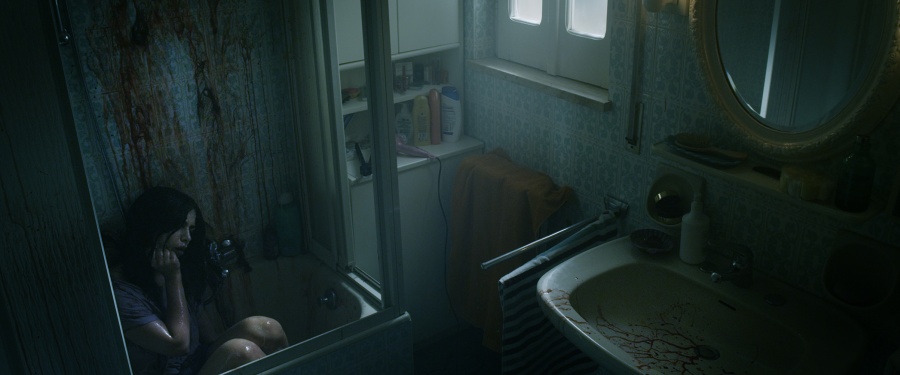
This looks like a job for Bounty, the quicker picker-upper.
Around this time, little things start to worry our American protagonist. He finds a hypodermic needle beside Louise’s toilet. On a hike up a mountain, he finds a sheep with its face removed, a serpent threading through the dead animal’s skull. On their next date, Evan asks Louise about the needle, and she claims it’s just a medical condition. Relieved his new squeeze isn’t a heroin user, he asks if they can take a photo together on his phone. In the resulting image, Louise’s face is blurry. “You moved,” Evan chides. Changing the subject, Louise wants to know all about his family, but Evan is reluctant to talk. She’s reluctant to have her photo taken, and they have a minor spat. Louise storms out of the seaside restaurant and sulks on the rocky beach. Evan follows.
On the beach, Louise pushes Evan to open up to him. He tells her about his small family, how both his father and mother died recently. She takes Evan in her lap and he outlines all his problems. Once he’s confessed all his feelings, he asks Louise to do the same, but Louise only reveals her two different eyes. The next day, Louise is in her medical lab, taking cheek swabs from locals. One man notices a terrible smell, and when he exits, Louise checks her armpits. Not only do they smell, they seem to be rotting entirely. She opens the fridge in the lab, but there’s no fresh meat to be found. She trudges to a secluded ruin with her pet rabbits in their carrying case. Once inside, she turns on Enya-like music, strips her clothes (revealing a gaunt, zombie-like body) and begins a strange ritual. She stabs one rabbit, drawing symbols on the ruin wall with its blood. She then collapses, only to rise again and devour the rest of the Bob raw. When the ritual is over, she’s shed her old, rotting skin like some very attractive snake.
When Evan visits her apartment that evening, he notices the rabbits are gone and Louise is not feeling well at all. Like a sweetheart, he pampers her in her ill health and tries to help her recover. The next day, work at the farm wraps up early, so Evan has the day to bum around town. Hanging out by the water, he spots some of those loud Americans that Thomas and Sam used to deride. He goes back to the art gallery, passing a portrait of a woman who also has different irises. He buys a book of “ancient Roman porn,” and when Louise finds him in the town square, he presents her with this gift. That night, their quiet dinner is disrupted by the same ugly Americans from the beach. Louise starts rotting (again), so she hastily pays the bill and hurries home.
Louise doesn’t quite make it, though. She crumples against a wall on her way home, and is accosted by the lead Ameri-bro, complete with goatee, cargo shorts, and American flag doo-rag. (It’s really a remarkably accurate costuming.) He starts to harass the clearly ill Louise, asking her for oral sex. When Louise turns to face him, she’s transformed into some sort of gill-woman. She attacks the American man with gusto, and a blind old woman on her front step listens on with approval. The following morning, the American ‘ambassador’ is splayed upon the rock, a gory mess where his Washington monument used to be.
Following her murder of the American tourist, Louise becomes standoffish with Evan. The next time she sees him, she decides they should break up, but Evan insists she reconsider. Louise shows Evan the door and he does his Charlie Brown walk home – passing some police interviewing the blind woman – and punches a wall in frustration. The next day, in the fields with Angelo, he thanks the old man for all he’s done. That’s when they see police arrive over the horizon. Immigration police. “Do I need to worry?” Evan asks Angelo. “Si.” Evan runs and returns – where else – to his old flame’s.
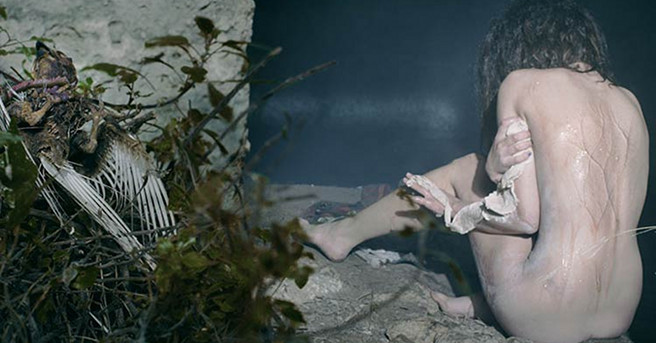
That’s *really* serious exfoliation.
When he arrives at Louise’s door, Evan sees it’s partially open (though locked with a chain) and blood is spattered on her floor. He smashes his way in and sees Louise has become part calamari! She writhes on the ground, a mess of tentacles from the torso outward. Evan sees she’s grasping for a hypodermic needle, so he attempts to help. A tentacle strikes his hand, burning it, but he persists, eventually injecting Louise in the neck. She transforms back into a beautiful woman in a very sqiucky manner and – with perfect comic timing – asks Evan to start the shower for her.
Obviously, Evan has a bunch of questions: he wants to know what she is – a vampire, a werewolf, what? But Louise refuses to provide explanations at first. In time, she reveals that she’s actually on the cover of the book of ancient Roman art Evan purchased for her. She posed for it 2,000 years ago(!). Louise’s body somehow uses embryonic cells to keep her the same age forever. She outlines a lot of hard science, but the short story is she gets pregnant every twenty years, and, in essence, gives birth to herself. And it looks like Evan is about to be a proud father … of his girlfriend. The only real problem is that leading up to the rebirth, Louise’s body transforms into different creatures from our evolutionary past.
Evan doesn’t know how to process this new information: he’s in love with Louise, but turning into a murderous fish-creature is a deal-breaker for most fellas. He calls his friend Tommy from a pay phone, but Tommy is too high to help him out. Then he sees his employer, Angelo, dressed in his corduroy Sunday best, weeping and placing flowers outside the church for his dead wife. Evan thinks it over and returns to Louise, confident they can work things out. Louise warns him that within a day, she will literally be a different person. But Evan is determined to see her through the rebirth. Louise tries to let Evan down easy and tell him she doesn’t love him – story of an Evan’s life! – but Evan asks for one more day together. They can go on a road trip. He’s confident she’ll fall in love with him by the end of the day. Of course he is. He is a white man, after all.
Louise worries that her transformations are getting worse and she’ll just end up killing him. The police begin to canvass the block and Evan, thinking they’re from immigration, insists they leave soon. So, almost by accident, they embark on their vacation. They have some good times – making out in Louise’s car by the side of the road, buying crack from street dealers (no joke), and touring the local historic churches. Now that her secret is out, Louise can’t stop telling thousands of years’ worth of anecdotes. Seated beside Evan in a church pew, Louise talks about how science has changed the world, how people with porphyria and rabies were called vampires before the days of modern medicine. Evan notices that she’s starting to zombify and suggests she inject herself. “What’s wrong?” a penitent man, a few church pews up, asks his wife. “A zombie was doing heroin,” she deadpans.
Evan starts to bargain with Louise: he wants her to ditch the rebirth. He wants her to use her adult cells instead of her embryonic ones, so that instead of being reborn, she simply has their child and grows old. (That’s a lot to ask, Evan!) But Louise doesn’t decide what her body does. “Then what does decide?” Evan asks. “Oxytocin,” she answers. The ‘love hormone.’ Essentially, if she were in love with Evan, her body would not give birth to itself. (Fun fact: that means Louise hasn’t been in love for 2,000 years!) Evan leans in for a kiss, and Louise quickly turns forms and snaps at his face with a new beak jaw, just like the necklace box did with Julia Roberts’s finger.
Louise takes Evan to her hometown, Pompeii. They walk around the plaster casts of the victims of Vesuvius, and Louise takes Evan to meet her parents. Or, at least, the plaster casts of their bodies. She then reveals that her mother was once immortal like her, but fell in love with her father. Evan again tries to convince Louise to fall in love with him (ugh), but Louise makes a very good point: “I don’t want to die, and I don’t want to watch anyone die.” Louise warns him that her final transformation before rebirth is the biggest and sharpest. She advises that when it starts, Evan start running. Evan then makes a case for finite existence. Speaking against immortality, he talks about how knowing there’s an expiration date on life is “motivation to make every second count.” (As someone spending most of the month watching and writing about horror movies, this really spoke to me.)
As Louise rests her head in Evan’s lap as they both sit on a stone wall in the middle of a pasture, her hand begins to rot. The transformation has begun. The camera focuses on Evan’s face as sound effects suggest a transformation is underway. He doesn’t budge, and when the camera pans down to the couple’s hands, Louise’s is perfectly fine and full of life. Looks like she did fall in love after all. The credits roll.
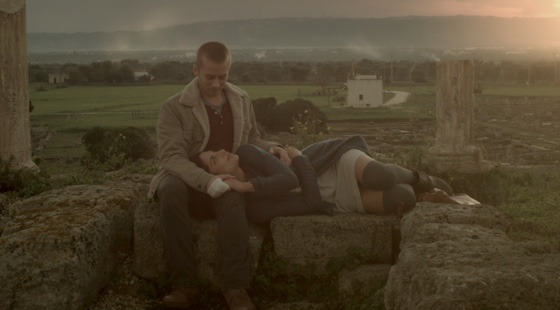
Is this a happy ending? Or, like, an Avril Lavigne happy ending?
Takeaway points:
- The best way to describe Spring is that it’s essentially Before Sunrise as written by Stephen King. Is it horror or a rom-com? It’s both. Generally, I’m a fan of blending genres: high school westerns, dance war movies, you name it. And for the most part, Spring really works. Evan and Louise’s meet-cute could use some work, but otherwise, their relationship follows a traditional romantic comedy arc, even to the point of Louise serving as a mutant pixie dream girl that lifts Evan out of his funk. And unlike most romantic comedies, it manages to actually be funny. There’s no shortage of quotable, witty lines. And it’s got its horror bona fides, as well. The monsters that Louise transforms into are icky and strange, and there’s even a fair amount of gore. Spring would probably make a good date movie for horror fans. Though I’d argue the movie takes the couple’s final day together a bit too far, as it begins to seep into Forrest Gump territory: Oh yeah, I was at the Salem witch trials, for sure. Escaped Pompeii, too.
- When discussing name determinism on their first date, Louise declares “Evans are nice.” (Something I will neither confirm nor deny.) But is this Evan a nice guy? Certainly, I would argue he is a more sensitive and thoughtful man than most male film protagonists. He expresses gratitude to his mother on her death bed, is thankful for Angelo’s help, is usually very kind toward Louise, and doesn’t even show the least signs of disgust when he learns about her ‘condition.’ He’s not your typical angry young man. Most critics usually throw some unfair dig at Evan, noting how ordinary and uninteresting he is. But he is, in some ways, just as extraordinary as Louise. However, he also is the unintentional villain of the piece. This is supposed to be a romance, but Evan is so insistent on Louise loving him, it becomes pathological, even scary. If Louise didn’t intermittently transform into random monsters, you’d fear for her safety. Louise many times indicates she doesn’t want to be in a relationship. She dumps him after one begins to gel. Yet, he keeps hanging around. Then, once he finds out love could end her immortality, he’s like a pit bull in his tenacious efforts to make this woman love him. Only her immortality isn’t a curse. Louise loves it. She very clearly states she doesn’t ever want to die. But still, he asks, why don’t you give up eternity to spend some okay years with him? That’s a lot to ask of someone you just met a week ago. And eventually, I guess Louise does fall in love, but only through the repeated pestering of Evan. Evan heard Louise express her desire – to not ever die, to not be in a relationship with him – and he felt he knew better. So, yes, Evan is a ‘nice’ guy.
- The science vs. religion aspect of Spring is neat. Because Louise, who is what most of us would consider a supernatural being, doesn’t think supernatural things exist. It’s just science that hasn’t been explained yet: “Evan, just because you’ve never seen something before doesn’t mean it’s supernatural.” Even a woman who gives birth to herself is unconvinced there is something beyond this mortal world. Evan, naturally, represents belief in religion. Though he doesn’t explicitly ever say so, his speech at the end about how human mortality gives life meaning echoes the “God gives us terrible lows so that we appreciate its highs” school of philosophy.
- Much of the film was shot using aerial drones, which explains how a relatively small-budget movie was able to include aerial shots of fruit orchards and Italian grottos.
- I am still baffled by Evan’s attempted hook-up at the beginning of the film, who fingers his passport and shouts “Why do you have this?!” in an accusatory tone. As if it were a counterfeit machine or submachine gun. Are passports really so rare in California? And so subversive? Does one need to have a particular motive to owning a passport?
Truly terrifying or truly terrible?: Spring isn’t a horror film that aims to terrify. There are a few scary and unsettling moments, but, as discussed in the takeaway points, this is more of a hybrid movie – more humorous than frightening. Some of the lines in Spring are really funny. Unusually so for a horror movie. (Typically, horror-comedies aim for more over-the-top, broad humour, but Spring manages to be fairly witty.) In the final act of the movie, some of the jokes about Louise living forever get a bit too hackneyed, threatening to topple the movie into the chasm of bad moviedom. But I felt Spring managed to avoid falling in, if only by a narrow margin.
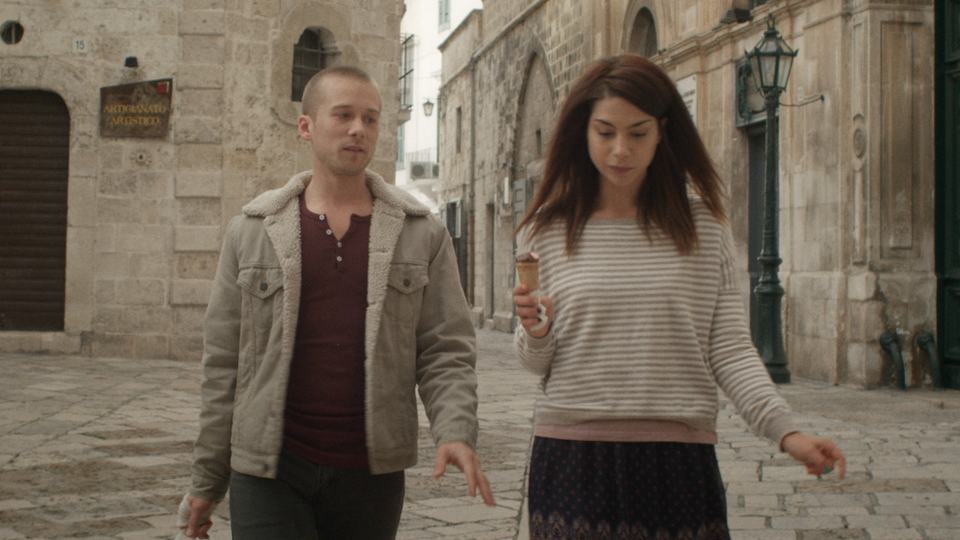
The best-dressed geneticist in southern Italy.
Best outfit:Louise is a sharp dresser, and she knows it. It’s a running joke through the film that Evan, having traveled to Italy in haste, wears the same clothes all the time, and Louise – often dressed to kill – complains about his uninspired wardrobe.
Best line: “Bro, I fookin’ blazed the WiFi code.” (We’ve all been there, Thomas.)
Best kill: The dirtbag who requests a blowjob, then has his Johnsonville Brat torn off and his body unceremoniously discarded on the rocks was a high point.
Unexpected cameo: Lou Taylor Pucci, who plays Evan, is St. Jimmy in the Green Day video for “Jesus of Suburbia“, and the oft-abused Eric in the Evil Dead remake. But also of note: a full third of the IMDb credits for Nick Nevern, who plays British lad Thomas, have the word “hooligan” in the title.
Unexpected lesson(s) learned: You can be a successful sous chef even if you have no sense of smell.
Most suitable band name derived from the movie: The Lady Gorilla, which is the name of Louise’s rowboat.
Next up: Rituals (1977).
